高中英语基本句型翻译练习精编版
高中英语基础写作单句翻译练习300句

10. He feels it his duty to help others.
11. 我盼望收到你的回信。 11. I am looking forward to hearing from you. 12. 他一定要我们俩都接受邀请。 12. He insisted on our both accepting the invitation. 13. 请接受我诚挚的歉意,我昨晚没参加宴会。 13. Will you kindly accept an apology for my
46. 我除了学英语,还学法语。 46. I’m learning French as well as English. 47. 这件事对你我都很重要。 47. It is important for you as well as for me. 48. 他不光给我钱,还给我建议。 48. He gave me money as well as advice. 49. 他不仅是著名诗人,还是著名剧作家。 49. He was not only a famous poet but also a
at last.
71. 10月30日凌晨,地处繁华地段的一幢办公楼 失火。
71. On the early morning of October 30, a big fire broke out in an office building in a busy street.
3. 夏天到湖里游泳多有趣呀!
3. What fun/How interesting it is to swim in a lake in summer!
高考英语经典句型翻译练习
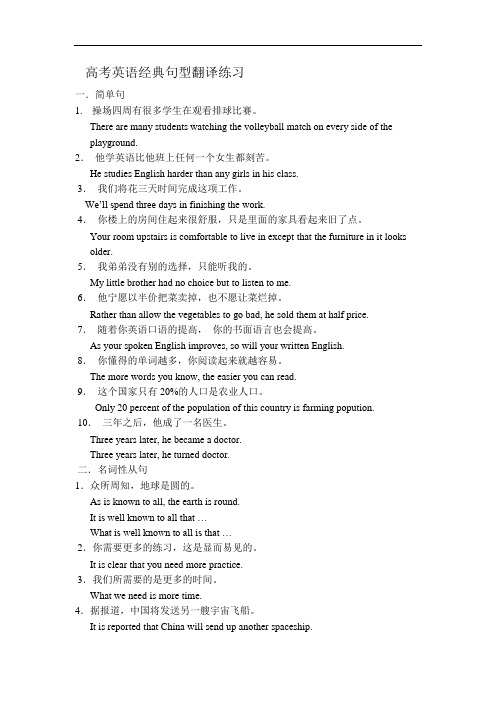
10.玩电子游戏是浪费时间。 It’s a waste of time to play computer games.
11.要不是你们的帮忙,我不可能赢了这场竞赛。 If it had not been for your help, I wouldn’t have won the competition.
Please remember to wash your hands before dinner. 8.看着这些照片,我情不自禁地想起了我在伦敦的日子。
Seeing these pictures, I couldn’t help thinking of those days when I was in London. 9.包括主席在内,有 15 人出席了会议。
12.得由你来决定下一步该做什么。 It’s up to you to decide what to do next.
六 There be 句型 1.既然问题已经解决了,我们没必要在讨论它。
There is no need for us to discuss the problem again since it has already been settled. 2.毫无疑问你错了。 There is no doubt that you are wrong. 3.没有可能弄到表演的票。 There is no chance of getting a ticket for the performance. 4.留得青山在,不怕没柴烧。 Where there is life, there is hope. 5.房前有一棵高大的树。 There stands a tall tree in front of the house. 6.这台机器好象有毛病。 There seems to be something wrong with the machine.
[高中英语]五种基本句型翻译练习(附答案)2份
![[高中英语]五种基本句型翻译练习(附答案)2份](https://img.taocdn.com/s3/m/20d76238240c844768eaee9b.png)
1 我的电脑已经坏了一个月了。
2 你觉得冷吗?3 这件衣服摸着又柔软又平滑。
4 赵氏一家都是本地人。
5 那个孩子似乎对故事书一点兴趣都没有。
6 他妈妈上个月突然生病了。
7 他比他的哥哥矮很多。
8 你将来想当发明家吗?9 你们的梦想最后实现了吗?10 你长得比以前壮实多了。
11 比赛将持续一个半小时。
12 我的工作是照顾三个小孩。
13 现在你最好保持安静。
14 他在战争中证明了他的英勇。
15 他总是表现得很完美。
16 我对这本小说一点都不感兴趣的,它很无聊。
17 这是李华的书,你的书在哪里啊?18 交通灯什么时候会变绿灯啊?哦,现在已经是绿灯了啊。
19 这就是你昨天缺席的原因吗?20 电影院里真安静啊,现在在演什么电影啊?21 现在已经五月二十五号了,你们都准备好即将到来的高考了吗?22 什么时候该我啊?我已经准备好表演了。
23 你们什么时候能准备好开始工作啊?24 我最近一直忙着参加考试呢。
25 我很久没有见你哥哥了,他在忙什么啊?26 孩子们,现在该是你们上床睡觉的时间了。
27 昨天晚上广场上有很多人。
28 你到实验室的时候,谁在里面啊?29 你根本没必要给他道歉的。
30 我们今天晚上会有一个访客来。
31 爸爸昨晚来看我的时候我刚好和好友出去买东西了。
32 最近我的电脑运作不怎么良好。
33 你们去年旅游了几个月啊?34 我们必须好好学习,天天向上。
35 铃声响了,孩子们冲出了教室。
36 昨晚这里发生了一起车祸。
37 树叶通常在秋天的时候掉落。
38 他们等了几天就是为了买一张火车票。
39 这个钢笔书写流利吗?40 他们已经谈了几个小时了?41 六年前我在西安外国语大学读书。
42 很抱歉,但是我们的会议将不得不再持续一个半小时。
43 我说话的时候你们最好看着屏幕。
44 1776年,英国伦敦爆发了一种严重的疾病。
45 不管别人说什么,我从来不在意的。
46 他过去常常落后于班上其他学生。
47 我不知道要如何处理这样的事情。
高中英语单句翻译练习精选840句

高中英语单句翻译练习精选840句高中英语单句翻译练习精选840句(附答案)Translation (1)1.她很有教书的才干。
真遗憾她放弃了她的教师职位。
(ability, abandon)2.每次我看到他的时候,他总是专心于他的功课。
(absorb)3.门锁上了,所以我们只得从窗户进入房间。
(access)4.我们的班主任和我们同学很亲近。
(accessible)5.Tom在告别会上自告奋勇弹钢琴为我伴奏。
(accompany)6.一些学生常把老师和家长的话当作耳边风,经常表现不佳。
(take …account of)7.班长昨天职责Jack上课迟到,今天又责备他做功课动作慢。
(accuse, blame)8.他于多年前养成抽烟的坏习惯,因此现在的健康越来越差。
(acquire)9.虽然他是新来的,但他很会适应新环境。
(adapt)10.在开学典礼上,校长代表全校致欢迎辞。
(address)11.我们订购了一些可根据孩子们不同高度任意调节的椅子。
(adjust)12.他承认丢了这间屋子的钥匙。
(admit)13.如果假期要出游,最好预先订好票。
(in advance)14.因她比别人在英语上更有优势,所以她轻易地得到了这份工作。
(advantage)15.就我的肺病我请求医生能给我些忠告,她劝我不要抽烟。
(advise)16.今年,我本可以腾出一周的时间去度假。
但老板要我放弃,我无法无视老板的命令。
(afford) 17.由于上了岁数,他的健康开始衰退。
此外,疾病使他老得更快。
(age)18.惟有努力学习,你才会赶超班上其他同学的。
(Only, go ahead)19.我祖父还很有活力,比我们年轻人更活跃。
他的双眼总是因为快乐而炯炯有神。
(alive) 20.据我所知,只有她能回答这个问题,所以我想与她单独谈谈。
(only, alone)Translation (2)1.我们当时急切地等待着那位歌手在舞台上出现。
高中英语基本句型汉译英练习

四.主谓宾补结构——S十V十O十C
此结构由主语+及物的谓语动词+宾语+宾 语补足语构成。 及物动词本身需要一个宾语外, 还需要一 个名词、形容词、副词、动词不定式、分 词来补充说明宾语,才能表达一个完整的 意念。
The sun keeps us warm.
宾语与宾语补足语有逻辑的主谓关系, 若无宾语补足语,则句意不完整。可 以用做宾补的有,名词,形容词,副 词,介词短语,动词不定式,分词。 如, You must get your hair cut. I heard him singing.
We elected Li Yang our monitor. The news made us sad. The teacher asked me to answer the question . I found the man stealing the money . I found my money stolen .
用to侧重指动作的方向,表示朝着,向着, 对着某人。 用for 侧重指动作的受益者,表示为了某 人,替某人。 常跟双宾语的动词有: (需借助to的)bring, give, lend, hand, offer, pass, pay, promise, return, send, show, teach, tell, write, ask,等。 (需借助for 的) buy, call, cook, choose, draw, find, get, make, order, sing, save, spare,等。
8. The apples tasted sweet. 9. He noticed a man enter the room. 10. Tom came to ask me for advice.
高中英语句子句型翻译练习

高中英语句子句型翻译练习英语句型翻译练习4我们没能按时完成计划。
5消防员终于把火给扑灭了。
一、用主谓结构翻译下列句子。
6我们住不起五星级的酒店。
1天在下雪。
7当爸爸回来时,我假装睡着了。
2我们耐心地等啊等。
8她决定留在武汉。
3盲人看不见东西。
9爸爸答应给我买一本字典。
4我昨晚睡得很香。
10我们将设法解决这个问题。
5我最近老是晚上做梦。
6大火持续了两个小时。
主语 + 及物动词 + 动名词7气温下降了十度。
1你介意我在这儿抽烟吗?8我们的计划失败了。
2我建议休息二十分钟。
9我一般星期天起床很晚。
3她忍不住哭了起来。
10 我的假期过得很快。
4我特别喜欢旅游。
11我咳了一整夜。
5她每天都练习弹钢琴。
12暴雨过后,天上出现了一道彩虹。
6我讨厌星期天上班。
13车祸中有两人死亡,十人受伤。
7他们直到半夜才停止工作。
14不久她就消失在人群之中。
8她避免跟他谈话。
15战争是什么时候爆发的?16我们在这所房子里住了十年了。
主语 + 不及物动词 + 介词 + 动名词17我们正在海南旅行。
9她梦想成为一个舞蹈演员。
18太阳还没有升起。
10我成功地通过了考试。
19时间过得可真快。
11你的幸福在于享受你所拥有的东西。
20她唱歌唱得真美。
12我在想给她写信。
13你的目标是什么?二用主谓宾结构翻译下列句子。
14他坚持要送我回家。
15他从不抱怨加班加点。
主语 + 不及物动词 + 介词 + 宾语主语 + 及物动词 + 宾语1我一直在找工作。
2我们已经等你半小时了。
1我认识他已经十年了。
3当我们到达山顶时,太阳还没有升起。
2我是 1995 年大学毕业的。
4当我们不在家时,谁照看我们的小狗。
3爸爸脾气不好的时候打我打得很厉害。
5看到这些旧照片我想起了我的童年时代。
4我无法用语言表达我的感受。
6许多人患有心脏病。
5我们已经在工作中取得了巨大的成绩。
7我们只能靠自己。
6艰苦的工作影响了他的健康。
8这个问题该怎样处理?7这座大楼是他们去年建的。
高中英语句子句型翻译练习
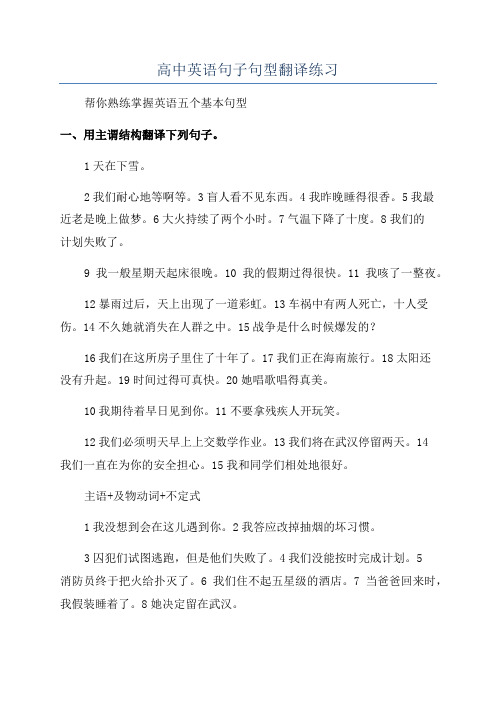
高中英语句子句型翻译练习帮你熟练掌握英语五个基本句型一、用主谓结构翻译下列句子。
1天在下雪。
2我们耐心地等啊等。
3盲人看不见东西。
4我昨晚睡得很香。
5我最近老是晚上做梦。
6大火持续了两个小时。
7气温下降了十度。
8我们的计划失败了。
9我一般星期天起床很晚。
10我的假期过得很快。
11我咳了一整夜。
12暴雨过后,天上出现了一道彩虹。
13车祸中有两人死亡,十人受伤。
14不久她就消失在人群之中。
15战争是什么时候爆发的?16我们在这所房子里住了十年了。
17我们正在海南旅行。
18太阳还没有升起。
19时间过得可真快。
20她唱歌唱得真美。
10我期待着早日见到你。
11不要拿残疾人开玩笑。
12我们必须明天早上上交数学作业。
13我们将在武汉停留两天。
14我们一直在为你的安全担心。
15我和同学们相处地很好。
主语+及物动词+不定式1我没想到会在这儿遇到你。
2我答应改掉抽烟的坏习惯。
3囚犯们试图逃跑,但是他们失败了。
4我们没能按时完成计划。
5消防员终于把火给扑灭了。
6我们住不起五星级的酒店。
7当爸爸回来时,我假装睡着了。
8她决定留在武汉。
9爸爸答应给我买一本字典。
10我们将设法解决这个问题。
主语+及物动词+动名词1你介意我在这儿抽烟吗?2我建议休息二十分钟。
3她忍不住哭了起来。
4我特别喜欢旅游。
5她每天都练习弹钢琴。
6我讨厌星期天上班。
7他们直到半夜才停止工作。
8她避免跟他谈话。
二用主谓宾结构翻译下列句子。
宾语1我一直在找工作。
2我们已经等你半小时了。
3当我们到达山顶时,太阳还没有升起。
4当我们不在家时,谁照看我们的小狗。
5看到这些旧照片我想起了我的童年时代。
6许多人患有心脏病。
7我们只能靠自己。
8这个问题该怎样处理?9你走的太快了,我赶不上你。
主语+不及物动词+介词+动名词9她梦想成为一个舞蹈演员。
10我成功地通过了考试。
11你的幸福在于享受你所拥有的东西。
12我在想给她写信。
13你的目标是什么?14他坚持要送我回家。
15他从不抱怨加班加点。
高中英语五种基本句型翻译练习答案

五种基本句型翻译练习主谓结构1.你应当努力学习。
You should study hard.2.她昨天回家很晚。
She went home very late yesterday.3.那天早上我们谈了很多。
We talked a lot that morning.4.会议将持续两个小时。
The meeting will last two hours.5.每天八时开始上课。
Classes begin at eight every day.6.这个盒子重五公斤。
This box weighs five kilos.7.五年前我住在北京。
I lived in Beijing five years ago.8.我们老师教得很好。
Our teachers teach very well.9.令人兴奋的时刻来了。
The exciting moment is coming.10.在过去的十年里,在我的家乡发生了巨大变化。
Great changes have taken place in my home town in the past ten years.主谓宾结构1.昨晚我写了一封信。
I wrote a letter last night.2.今天下午我想同你谈谈。
I want to talk with you this afternoon.3.这本书他读过多次了。
He has read this book many times.4.他们成功地完成了计划。
They have carried out the plan successfully.5. 你们必须在两周内看完这些书。
You must finish reading these books in two weeks.6. 那位先生能流利地说三种语言。
That gentleman can speak three languages fluently.7.我收到了笔友从澳大利亚寄来的信。
高一英语基础句型二百句翻译练习
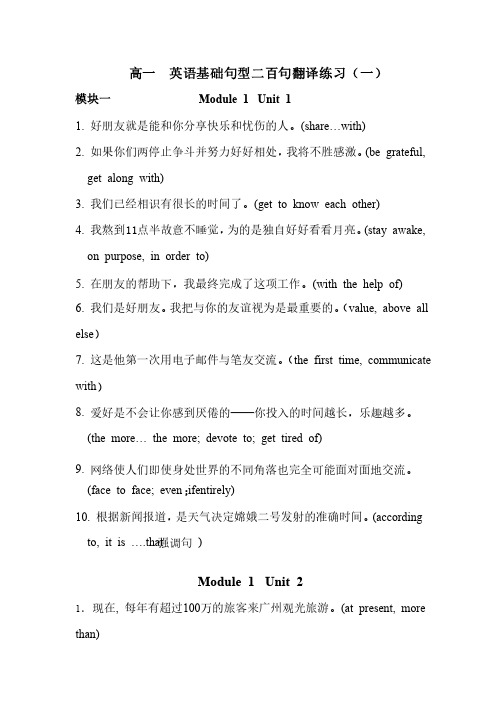
高一英语基础句型二百句翻译练习(一)模块一Module 1 Unit 11. 好朋友就是能和你分享快乐和忧伤的人。
(share…with) 2. 如果你们两停止争斗并努力好好相处,我将不胜感激。
(be grateful, get along with)3. 我们已经相识有很长的时间了。
(get to know each other)4. 我熬到点半故意不睡觉,为的是独自好好看看月亮。
(stay awake, 我熬到111111点半故意不睡觉,on purpose, in order to)5. 在朋友的帮助下,我最终完成了这项工作。
(with the help of)6. 我们是好朋友。
我把与你的友谊视为是最重要的。
(value, above all else)7. 这是他第一次用电子邮件与笔友交流。
(the first time, communicate with)8. 爱好是不会让你感到厌倦的——你投入的时间越长,乐趣越多。
你投入的时间越长,乐趣越多。
(the more… the more; devote to; get tired of)9. 网络使人们即使身处世界的不同角落也完全可能面对面地交流。
(face to face; even if;entirely)10. 根据新闻报道,是天气决定嫦娥二号发射的准确时间。
(according to, it is ….that强调句强调句 )Module 1 Unit 21.现在, 每年有超过100万的旅客来广州观光旅游。
(at present, more than)2. 他们的友谊是建立在多年相互开放沟通的基础上的。
(base on, communication)3. 世界淡水资源十分有限,因此我们必须充分利用。
世界淡水资源十分有限,因此我们必须充分利用。
(make use of, resources)4. 我将十分乐意参加任何能丰富我对世界认识的讨论。
高中英语六种基本句型练习(附答案)

高中英语六种基本句型练习(附答案)六种基本句型翻译训练一、辨形练习1. Time flies.2. Class begins!3. The man doesn’t smoke.4. We all laughed.5. Everybody has arrived.6. I am crying.7. The sun rises.8. Does it hurt?9. The book sells well.(sell等词用主动形式表示被动意义) 以上9个例句均属于句型结构。
1. This is an English-Chinese dictionary.2. The book is interesting.3. The dinner smells delicious.4. Everything looks different.5. His face turned red.6. He feel happy.7. The weather becomes warmer.8. I’m happy to meet you.9. They are willing to help.以上9个例句均属于句型结构。
1. Who knows the answer?2. She laughed at him.3. He understands English.4. Tom made cakes.5. They ate some apples.6. Danny likes donuts.7. I want to have a cup of tea.8. The teacher said “Good morning.”以上8个例句均属于句型结构。
1. Lily passed her sister a new dress.2. He cooked her a delicious meal.3. She bought her husband a new watch.4. He brought you a dictionary.5. I told her nothing.6. I gave him my pictures.7. I gave him a hand.8. He showed me how to run the machine.9. John sent Mary some flowers.以上9个例句均属于句型结构。
高中英语句子汉译英翻译练习

高中英语汉译英1稍等一会儿,我会帮助你的。
请尽早做出决定,不然你会坐失良机.(or)2他们作了自我介绍。
(introduce)3请去查询下班火车什么时候开。
(find out)4昨天下午2时到4时你在做什么?(过去进行时)5我正在吃晚饭,电话铃响了。
6不仅我,而且汤姆和玛丽都喜欢游泳。
(be fond of)7他今天感到身体好多了。
(a lot)8礼堂里早已挤满了高中学生。
(be full of)9我在街上走时,看到了一些古老的建筑物。
(while)10我走近花园时,几个男孩子在爬树。
(用过去进行时)11请脱下你的旧上衣,穿上这件新的。
(take off, put on)12这件事是什么时候发生的?(happen)13他去办公室查询课程表.(ask abut)14当我们到达车站时,火车已开出了。
(过去完成时)15他服药后,开始感到好些了.(过去完成时)16 我观看体育节目你有意见吗? (mind) :介意做某事17我还没有读完那本有关伦敦的书.(finish) finish doing:完成做某事18 他没有跟我说一声就离开了山村。
(without)19我告诉她我已把餐具洗好了。
(过去完成时) wash up20汤姆上楼去他的卧室时,他的姐姐已把他的上衣改短了一英寸。
(过去完成时) 21我和汤姆都盼望早日见到您。
(look forward to).22全世界的人都在电视上观看奥运会.(all over the world)23我听说这场比赛将延期。
(put off).24这里要讲英语.(被动)25这座体育馆将于明年建成.(被动语态)26过马路时要小心.(be careful)27这次车祸是什么引起的?(cause)28她总是乐于助人.(be ready to).29这个女孩由于不遵守交通规则,在车祸中受了伤。
(被动).30到时候会通知你的.(被动语态)31我根本不喜欢这个铜的框架。
(not…at all) not…at all:一点都不32他把玫瑰栽在花园中间.(in the middle)33他不知道她为什么在练习中有这么多的错误.(wonder)34他告诉我一切都会好的。
2020高中英语简单句翻译练习100题(整理)含答案
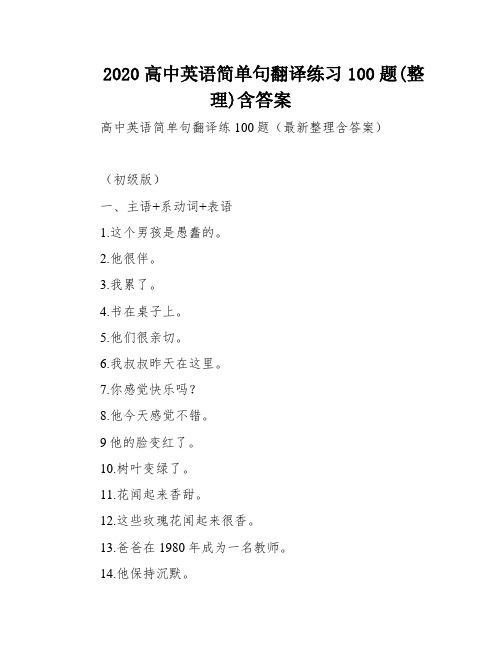
2020高中英语简单句翻译练习100题(整理)含答案高中英语简单句翻译练100题(最新整理含答案)(初级版)一、主语+系动词+表语1.这个男孩是愚蠢的。
2.他很伴。
3.我累了。
4.书在桌子上。
5.他们很亲切。
6.我叔叔昨天在这里。
7.你感觉快乐吗?8.他今天感觉不错。
9他的脸变红了。
10.树叶变绿了。
11.花闻起来香甜。
12.这些玫瑰花闻起来很香。
13.爸爸在1980年成为一名教师。
14.他保持沉默。
15.这个故事听起来有趣。
16.她看起来像她妈妈。
17.夏天,天气变热了。
18他疯了。
19.我整夜没睡。
120.孩子们,请保持安静。
二、主语+谓语(不及物动词)1.我来。
2.他来日诰日来。
3.他事情。
4.他在这个工厂工作。
5.他勉力事情。
6.他正在事情。
7.他常常在河里泅水。
8.雨停了。
9.我在海滩玩了一个下战书。
10.他永远在我们心里。
11.下午四点半我们回到了学校。
12.会议九点开始.13.太阳从东方升起。
14.2010年至2016年我在XXX(Guangming Primary School)研究。
15.时间很快过去了。
16.曩昔他气XXX起。
217.我叔叔昨天回家很晚。
18.十年前我住在广州。
19.天世界战书有很多学生来到藏书楼借书。
20.我姐姐英语学得不错。
3、主语+谓语+宾语1.我喜欢音乐。
2.去年我建了所房子。
3.本日我在街上买了台电脑。
4.去年我哥哥通过了考试。
5.那些学生回答了那些问题。
6.本日我弟弟学骑自行车。
7.我平日在礼拜六早晨看电视。
8.他们中两个人都在学校图书馆工作。
9.我妈妈曾经清扫了XXX房间。
10.XXX喜爱集邮。
11.我在北京遇到了我的一个朋友。
12.我堂兄要去上大学。
13.这位护会好好照应你父亲的。
14.我不信任那个人,15.圣诞节我们去探望外籍教师。
16.我们也在校园内和周围种上了许多树。
17.晚上,我可以看电视新闻或看报纸。
318.我mm现在正在写一封信。
19.去年在学校电脑竞赛中获得一等奖。
高中英语句子翻译基础训练(附答案)1
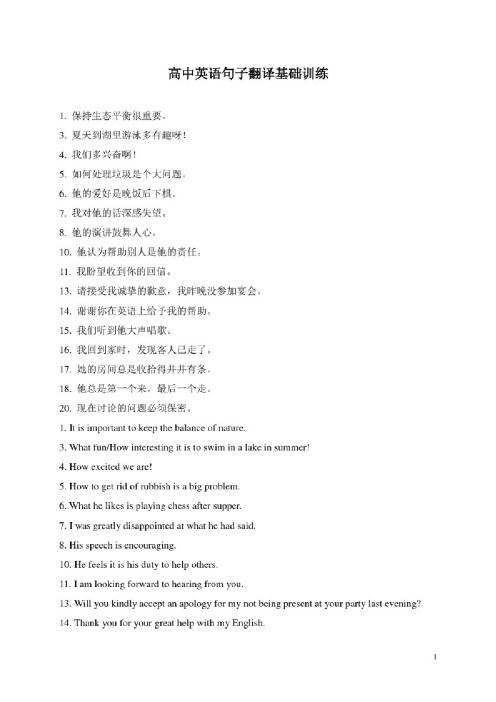
高中英语句子翻译基础训练1.保持生态平衡很重要。
3.夏天到湖里游泳多有趣呀!4. 我们多兴奋啊!5.如何处理垃圾是个大问题。
6.他的爱好是晚饭后下棋。
7.我对他的话深感失望。
8.他的演讲鼓舞人心。
10,他认为帮助别人是他的责任。
11.我盼望收到你的回信。
13.请接受我诚挚的歉意,我昨晚没参加宴会。
14.谢谢你在英语上给予我的帮助。
15.我们听到他大声唱歌。
16.我回到家时,发现客人已走了。
17.她的房间总是收拾得井井有条。
18.他总是第一个来,最后一个走。
20.现在讨论的问题必须保密。
I.It is important to keep the balance of nature.3. What fun/How interesting it is to swiin in a lake in summer!4. How excited we are!5.How to get rid of mbbish is a big problem.6. What he likes is playing chess after supper.7. I was greatly disappointed at what he had said.8. His speech is encouraging.10.He feels it is his duty to help others.II.I am looking forward to hearing from you.13.Will you kindly accept an apology for my not being present at your party last evening?14.Thank you for your great help with my English.15.We heard him singing in a loud voice.16.When I get home,1found the guests gone.17.Her room is always in good order.18.He is always the first to come and the last to leave.20.The problem being discussed here must be kept secret21.我多么懊悔在林间和田野里浪费那么多时间!22.她轻轻地走进来,以免吵醒睡觉的孩子。
高中英语基本句型翻译练习精编版共47页文档

1、最灵繁的人也看不见自己的背脊。——非洲 2、最困难的事情就是认识自己。——希腊 3、有勇气承担命运这才是英雄好汉。——黑塞 4、与肝胆人共事,无字句处读书。——周恩来 5、阅读使人充实,会谈使人敏捷,写作使人精确。——培根
高中英语基本句型翻译练习精编版
1、合法而稳定的权力在使用得当时很 少遇到 抵抗。 ——塞 ·约翰 逊 2、权力会使人渐渐失去温厚善良的美 德。— —伯克
3、最大限度地行使权力总是令人反感 ;权力 不易确 定之处 始终存 在着危 险。— —塞·约翰逊 4、权力会奴化一切。——塔西佗
5、虽然权力是一头固执的熊,可是金 子可以 拉着它 的鼻子 走。— —莎士 比
高中英语基本句型翻译练

高中英语基本句型每日练9. 我们一定派人去请医生。
(一)主谓构造1. 她昨天回家很晚。
(四)复合宾语构造1. 他的父亲母亲给他取名为 John.2.会议将连续两个小时。
3.2.我们大家都认为他是诚实的。
在过去的十年里,我的家乡已经发生了巨大的变化。
4.3.他们把门推开了。
这类事情全球各地每日都在发生4.我们要使学校变得更漂亮。
年,在北京迸发了“五. 四”运动。
5.我要你把实情告诉我。
6.这个盒子重五公斤。
7.6.明日我要找人来维修机器。
秋季有些鸟飞到南方去。
7.每日清晨我们都听到他高声朗诵英语。
8.我的爷爷清晨起得很早。
8.9.每日下午有很多学生到图书室来借书。
难过使得他叫唤起来。
9.我们不会让她在夜晚出门的。
(二)系表构造1.冬天白日短,夜晚长。
10.他每个月理一次发。
2.布朗夫人看起来很健康。
11.我要请人把我的录音机维修一下。
3.十五岁他就成为出名的钢琴家了。
12.那可怕的声音把孩子们吓坏了。
4.她的工作是在少儿园里照看小孩。
13.她正在听人家讲故事。
5.他失业了。
14.我素来没看见这个字这样用过。
6.树叶已经变黄了。
15.他感觉很难跟你谈话。
7.这个报告听起来很存心思。
16.我认为有可能用另一种方法解题。
(三)主谓宾构造17.学校定了一条规则,开始上课时学生要起立。
1.昨晚我写了一封信。
18. 2.我认为与那个人讲话是无益的。
他们成功地达成了计划。
(五) Therebe 句型3.你们一定在两周内看完这些书。
1.今夜没有会。
还不会自己穿衣服。
2.这个村庄过去只有一口井。
5.我们大家都相信 Jack 是一个诚实男孩。
3.这个学校有一名音乐老师和两名美术老师。
6.他不知道说什么好。
4.客人中间有两名美国人和两名法国人。
7.我开窗户你在乎吗? 5.天气预告说下午有狂风。
短语动词 6.灯亮着,办公室里必定有人。
1.他指出了我的作文中的错误。
7.战前这儿向来有家电影院的。
2.圣诞节我们将去探望外籍教师。
- 1、下载文档前请自行甄别文档内容的完整性,平台不提供额外的编辑、内容补充、找答案等附加服务。
- 2、"仅部分预览"的文档,不可在线预览部分如存在完整性等问题,可反馈申请退款(可完整预览的文档不适用该条件!)。
- 3、如文档侵犯您的权益,请联系客服反馈,我们会尽快为您处理(人工客服工作时间:9:00-18:30)。
短语动词
1.他指出了我的作文中的错误。 2.圣诞节我们将去看望外籍教师。 3.五分钟内我们是不可能解出这道题来的。
4.他们高度赞扬了英雄的业迹。 5.这位护士会好好照顾你父亲的。
1.He pointed out(副) the mistakes in my composition. 2.On Christmas Day, we will call on(介)our foreign teachers. 3.We cannot work out(副) the problem in five minutes. 4.They sang high praise for the deeds of the hero. 5.The nurse will take good care of your father.
8. 铃响了.让我们开始上课. 9. 我们确实有自己的校车. 10. 每天一定要留出半个小时进行口语练习.
8. There goes the bell. Let’s begin our class. 9. We do have a school bus of our own. 10.Be sure to set aside half an hour each day for oral practice.
并列句基本句型
1.再努力一下,你肯定能考上重点大学. 2. 别再粗心了,否则你意识不到会犯同样的错误. 3. 天下着雨,因此野餐被延期.
1.Another effort, and you are sure to enter a key university.
2. Don’t be careless again, or you won’t be aware of making the same mistake.
4.Jim 还不会自己穿衣服。 5.我们大家都相信Jack 是一个诚实男孩。 6.他不知道说什么好。 7.我开窗户你在意吗?
4.Jim cannot dress himself. 5.All of us believe that Jack is an honest boy. 6.He did not know what to say. 7.Do you mind my opening the window?
3.他发现他们坐在桌旁下棋.
本 句
4. 老人凝望着照片,陷入了沉思.
型
1.This book is rather too difficult for children. 2. The directors elected John manager of the bank. 3. He found them seated at the table, playing chess. 4. The old man was deep in thought with his eyes fixed on the photo.
(二)系表结构
1.冬季白天短,夜晚长。 2.布朗夫人看起来很健康。 3.十五岁他就成为有名的钢琴家了。
1.In winter, the days are short and the nights are long. 2.Mrs Brown looks very healthy. 3.At the age of fifteen he became a famous pianist.
7.秋天有些鸟飞到南方去。 8.我的爷爷早晨起得很早。 9.每天下午有许多学生到图书馆来借书。
7.In autumn, some birds fly to the south. 8.My grandfather gets up early in the morning. 9.Every afternoon a lot of students come to the library to borrow books.
6.你在工作中可依靠他。 7.写完作文后,我们必须把它从头到尾看一遍。 8.脱掉你的外套,走前再穿。 9.我们必须派人去请医生。
6.You can depend on(介) him in your work. 7.After writing a composition, we must go over(介) it. 8.Take off your coat and put it on(副) before you leave. 9.We must send for(介) a doctor.
(五)There be 句型
1.今晚没有会。 2.这个村子过去只有一口井。 3.这个学校有一名音乐老师和两名美术老师。 4.客人当中有两名美国人和两名法国人。 5.天气预报说下午有大风。
1.There isn't going to be a meeting tonight.
2.There was only a well in the village.
14.我从来没看见这个字这样用过。 15.他感到很难跟你交谈。 16.我认为有可能用另一种方法解题。 17.学校定了一条规则,开始上课时学生要起立。 18.我认为与那个人谈话是无益的。
14.I have never seen the word used that way before. 15.He felt it very difficult to talk with you. 16. I consider it possible to work out the problem in another way. 17.The school made it a rule that the students should stand up when class begins. 18.I thought it no use talking with that man.
3.There is a teacher of music and two teachers of art in the
school.
4.Among the guests there were two Americans and two
Frenchmen.
5.The weatherman says there'll be a strong wind in the
11.在这个山洞前面长着一棵高大的松树。 12.铃响了。
11.In front of the cave, there stands(grows) a tall pine tree. 12.There goes the bell.
1.这本书让孩子们读太难了.
简 单
2.董事们选举约翰为银行经理.
句 基
(三)主谓宾结构
1.昨晚我写了一封信。 2.他们成功地完成了计划。 3.你们必须在两周内完这些书。
1.I wrote a letter last night. 2.They have carried out the plan successfully. 3.You must finish reading these books in two weeks.
5.他查阅英汉词典以查明这个词确切的含义. 6. 只有这样你们才有希望改善那里的局势. 7. 要她用现金买车是不可能的.
5.He looked up the word in the English-Chinese dictionary to find out its exact meaning. 6. Only in this way can you hope to improve the situation there. 7. It’s impossible for her to buy a car with cash.
afternoon.
6.灯亮着,办公室里肯定有人。 7.战前这儿一直有家电影院的。 8.恰好那时房里没人。 9.从前,在海边的一个村子里住着一位老渔夫。 10.公共汽车来了。
6.The light is on. There must be someone in the office. 7.There used to be a cinema here before the war. 8.There happened to be nobody in the room. 9.Once there lived an old fisherman in a village by the sea. 10.There comes the bus.
5.我要你把真相告诉我。 6.明天我要找人来修理机器。 7.每天早晨我们都听到他大声朗读英语。 8.痛苦使得他叫喊起来。
5. I want you to tell me the truth. 6. Tomorrow I’ll have someone repair the machine. 7.Every morning we hear him read English aloud. 8.The pain made him cry out.
3. It was raining, therefore the picnic was postphoned.
4. 她以为我正谈论她的女儿,然而事实上我正在谈 论我的女儿. 5. 他不仅冲洗汽车,而且又擦拭了它 . 6. 小明肯定在家,因为他家的灯亮着.
4.She thought I was talking about her daughter, while, in fact, I was talking about my daughter. 5. Not only did he wash the car but he polished it. 6. Xiao Ming must be at home, for the lights are still on.
9.我们不会让她在晚上外出的。 10.他每个月理一次发。 11.我要请人把我的录音机修理一下。 12.那可怕的声音把孩子们吓坏了 。 13.她正在听人家讲故事。
